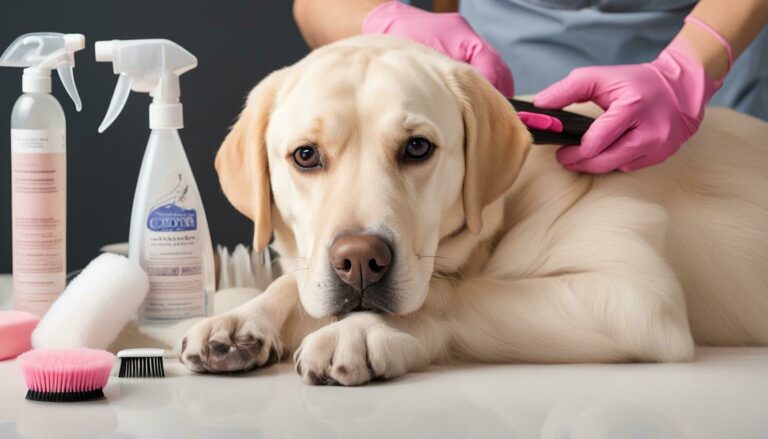As a loving owner of a Labrador, you want to ensure that your furry friend is healthy and happy. One of the most crucial steps towards achieving this goal is through regular vet check-ups.
Veterinary care for Labradors is essential, not only for treating illnesses but also for preventing them. Regular vet check-ups can help detect underlying health issues and address them before they become severe, ensuring your Labrador’s ongoing health and well-being.
Key Takeaways
- Regular vet check-ups are crucial for the health and well-being of Labradors.
- Veterinary care for Labradors is necessary not only for treating illnesses but also for preventing them.
- Preventive care through regular vet check-ups can help detect underlying health issues early and address them appropriately.
Understanding Preventive Care for Labradors
As a responsible pet owner, it’s essential to prioritize your Labrador’s health and well-being. This includes understanding the concept of preventive care and its significance in maintaining your Labrador’s health.
Preventive care involves taking proactive measures to prevent the onset of diseases and illnesses in your Labrador. This includes regular check-ups with a veterinarian, vaccinations, and other preventive measures recommended by your vet.
Regular vet check-ups are an essential component of preventive care for Labradors. These check-ups allow the veterinarian to assess your Labrador’s overall health and well-being, identify any potential health concerns, and develop personalized care plans.
By detecting health issues early on, preventive care through regular vet check-ups can help avoid more severe health problems in the future. It can also help minimize healthcare costs in the long run.
Ultimately, preventive care is critical to ensuring the longevity and overall health of your Labrador. By taking preventive measures, you can help ensure that your beloved pet leads a healthy and happy life.
The Role of Regular Vet Check-ups in Labradors’ Health
If you’re a Labrador owner, you already know how much your furry friend means to you. That’s why it’s essential to prioritize their health by scheduling regular check-ups with a trusted veterinarian. Regular vet check-ups are key to maintaining your Labrador’s overall health and well-being, as they play a critical role in preventative care for Labradors.
So, what is the recommended frequency of check-ups for Labradors? To ensure optimal health, Labradors should have a visit with a veterinarian at least once a year. However, more frequent visits may be recommended for senior Labradors or those with underlying health conditions. These check-ups are essential for ensuring that your Labrador is healthy and happy.
During these veterinary check-ups, Labradors undergo a thorough physical exam that may include blood work, urinalysis, and fecal testing. These tests are essential to detect any underlying health issues, including parasites, infections, or diseases. By catching these problems early, your veterinarian can develop personalized care plans to keep your Labrador healthy and happy.
Regular vet check-ups also play an important role in monitoring your Labrador’s weight, nutritional status, and exercise habits. Your veterinarian can provide guidance on proper nutrition and exercise, which are crucial to maintaining your Labrador’s health and preventing obesity-related health problems.
In summary, regular vet check-ups are an essential part of veterinary care for Labradors. By scheduling annual visits with a trusted veterinarian, you can ensure that your furry companion receives the best preventative care possible. Remember, taking care of your Labrador’s health today means a happier and healthier future.
Benefits of Labradors’ Regular Medical Exams
Regular medical exams for your Labrador are crucial for their overall health and well-being. By scheduling check-ups with your veterinarian, you can detect any health issues at an early stage and prevent the progression of diseases.
Preventive care is significant in keeping your Labrador healthy. Regular exams include assessing your pet’s weight and body condition, breathing, heart rate, and oral health. Your veterinarian may take blood and urine samples for laboratory testing to detect underlying health problems that may not be visible during a physical exam.
Personalized care plans can be developed based on the results of these tests. Preventive care measures, such as flea and tick prevention, heartworm medication, and dental cleanings, can be recommended to protect your Labrador and keep them healthy.
Early detection of health issues is critical for your Labrador’s well-being. Common health conditions in Labradors include hip and elbow dysplasia, ear infections, obesity, and dental diseases. By detecting these early on, your veterinarian can provide treatments and recommendations to manage or cure the conditions.
According to the American Animal Hospital Association, regular check-ups for adult dogs should be scheduled every six months, while senior dogs should have check-ups every three to six months. Depending on your pet’s health condition, your veterinarian might recommend a more frequent schedule.
In summary, the benefits of regular medical exams for Labradors include:
- Early detection of health problems
- Prevention of diseases
- Personalized care plans
- Improved overall health and well-being
By prioritizing your pet’s health through regular vet check-ups and following preventive care measures, you can help your Labrador lead a healthy and fulfilling life.
Vaccinations: A Crucial Component of Labradors’ Health
Keeping up with your Labrador’s vaccination schedule is an essential part of their preventive care plan. Vaccines can protect your furry friend from a range of diseases, some of which can be fatal.
When it comes to vaccinations, it’s critical to follow a schedule tailored to your Labrador’s specific needs. Speak to your veterinarian about which vaccines are necessary and how often they should be given. Some of the most common vaccinations for Labradors include:
| Vaccine | Recommended Frequency |
|---|---|
| Rabies | Every 1-3 years |
| DHPP (Distemper, Hepatitis, Parvovirus, Parainfluenza) | Every 3 years |
| Bordetella | Every 1 year (or more frequently for high-risk dogs) |
| Leptospirosis | Every year or every 3 years, depending on the vaccine type |
Regular vet check-ups are essential for administering vaccinations and ensuring that your Labrador is up to date with their vaccines. During these visits, your veterinarian may recommend additional vaccines based on your dog’s lifestyle and risk factors.
Remember, vaccines are just one aspect of a comprehensive preventive care plan for your Labrador. Regular vet check-ups, proper nutrition, exercise, and a safe living environment are all crucial in keeping your furry friend healthy and happy.
Choosing the Right Veterinarian for Your Labrador
Choosing the right veterinarian for your Labrador is crucial for their health and well-being. Regular vet check-ups are an important part of preventive care for Labradors, so finding a reliable and experienced veterinarian is essential. Here are some tips to help you select the right veterinarian for your furry friend.
Ask for Recommendations
Start by asking fellow Labrador owners for recommendations. They can provide valuable insights into their own experiences with local veterinarians. You can also consult with breeders or your local animal welfare organization, such as the ASPCA, for recommendations.
Check Credentials
Once you have a list of potential veterinarians, check their credentials. They should be licensed and accredited by the American Animal Hospital Association (AAHA). You can also check their online reviews to get an idea of their reputation.
Visit the Practice
Visit the veterinarian’s practice before scheduling an appointment. Check the cleanliness and organization of the facilities. Observe how the staff interacts with patients and clients. If you feel comfortable with the atmosphere and staff, your Labrador will likely feel comfortable too.
Communication is Key
Communication is key in developing a strong relationship with your veterinarian. You should be open and honest about your Labrador’s health and medical history, as well as any concerns you have. The veterinarian should be willing to answer your questions and provide guidance on preventive care for your Labrador.
Conclusion
Choosing the right veterinarian is crucial for your Labrador’s health and well-being. Regular vet check-ups are an essential part of preventive care, so take the time to find a reliable and experienced veterinarian. By following these tips, you can ensure that your furry friend receives the best possible veterinary care.
Preparing for a Labrador’s Vet Check-up
Regular vet check-ups are vital for ensuring the health and well-being of your Labrador. To make the most of your visit, it is crucial to prepare your furry friend beforehand. Here are some practical tips to help you get ready:
- Gather necessary medical history: Bring any medical history, previous vaccination records, and medications your Labrador is currently taking. This information will help your veterinarian in assessing your pet’s overall health.
- Make a list of questions: Think about any concerns or questions you may have about your Labrador’s health. Write them down to ensure that you don’t forget to ask.
- Keep your Labrador calm: Vet visits can be stressful for pets, so it is essential to keep your Labrador calm and relaxed. Bring their favorite toy or treat to keep them distracted and happy during the visit.
- Be honest: Tell your veterinarian about any changes you have noticed in your pet’s behavior or health. Even minor changes can be significant in detecting potential health issues early.
- Follow the veterinarian’s instructions: Most importantly, follow your veterinarian’s recommendations for your pet’s preventive care. They may suggest laboratory tests or other procedures to maintain your pet’s health.
By following these tips, you can help ensure the visit goes smoothly and your Labrador receives the best possible veterinary care.
Common Health Issues in Labradors and Vet Check-ups
Labradors are generally healthy dogs, but like all breeds, they can be prone to certain health conditions. By scheduling regular check-ups with your veterinarian, you can catch potential health issues early on and manage them effectively. Here are some of the most common health issues in Labradors:
| Health Issue | Description |
|---|---|
| Obesity | Labradors love to eat, and it’s easy for them to gain weight. Obesity can lead to a range of health problems, including joint issues, diabetes, and heart disease. |
| Dysplasia | Labradors are prone to hip and elbow dysplasia, which occurs when the hip or elbow joint doesn’t develop correctly. This can cause pain, lameness, and arthritis. |
| Eye Problems | Labradors can develop several eye problems, including cataracts, glaucoma, and retinal dysplasia. Regular eye exams can help detect these issues early on. |
| Allergies | Labradors can be allergic to a range of things, including food, dust, and pollen. Allergies can cause skin irritation, itching, and ear infections. |
Regular vet check-ups can help catch these health issues early on and ensure your Labrador receives the proper treatment. It’s important to communicate with your veterinarian about any concerns you have and follow their recommended course of action. In addition to regular check-ups, there are several things you can do to keep your Labrador healthy, including providing a balanced diet, regular exercise, and keeping their living environment clean. With the proper care and attention, your Labrador can live a long, happy, and healthy life.
Labradors and Aging: The Importance of Continued Vet Check-ups
As your Labrador ages, regular vet check-ups become even more crucial in ensuring their health and well-being. It is important to maintain the same frequency of check-ups recommended by your veterinarian, if not more frequently. Senior Labradors are more prone to certain health issues, and regular check-ups can help detect and manage these issues early on.
During check-ups for aging Labradors, your veterinarian will likely conduct more thorough exams, including blood work, urinalysis, and other diagnostic tests to closely monitor their health. Your veterinarian will also be able to advise on changes to their diet, exercise routine, and overall care in light of their aging status.
With age, Labradors may develop health concerns such as arthritis, diabetes, and cancer. By maintaining regular vet check-ups, these health concerns can be identified early on, and proper medical care can be provided to manage and treat them.
It is important to remember that aging Labradors require special attention and care, and regular vet check-ups play a significant role in maintaining the quality of their life. Don’t forget to communicate any concerns or changes in your Labrador’s behavior or overall health with your veterinarian during check-ups.
Conclusion
As a responsible Labrador owner, it is crucial to prioritize your furry friend’s health. Regular vet check-ups are an essential component of maintaining your Labrador’s overall well-being. By following preventive care measures recommended by your veterinarian, you can help identify potential health concerns early and address them promptly.
During check-ups, your vet can administer necessary vaccinations, conduct routine screenings, and provide personalized care recommendations tailored to your Labrador’s specific needs. By choosing an experienced veterinarian and building a strong relationship, you can ensure your Labrador receives the best possible care.
As your Labrador ages, regular vet check-ups become even more important. Senior Labradors may face age-related health issues that require close monitoring and care. By scheduling continuous check-ups, you can enhance the quality of life for your furry friend in their golden years.
Remember, regular vet check-ups are not just about treating problems as they arise. They are also a crucial part of preventive care for your Labrador, helping to detect issues early and keeping them healthy for years to come.
So, make sure to schedule regular vet check-ups for your Labrador and follow through on your veterinarian’s recommendations for preventive care. With your commitment to their health and well-being, your Labrador can enjoy a long and happy life by your side.
FAQ
Q: Why are regular vet check-ups important for Labradors?
A: Regular vet check-ups are important for Labradors because they help ensure their overall health and well-being. They allow veterinarians to detect and address any potential health issues early on, leading to better treatment outcomes and a longer, healthier life for your Labrador.
Q: How often should I take my Labrador for a vet check-up?
A: The frequency of vet check-ups for Labradors can vary depending on their age and overall health. As a general guideline, it is recommended to take your Labrador for an annual check-up, but more frequent visits may be necessary for puppies, senior dogs, or those with pre-existing health conditions. Your veterinarian can provide specific recommendations based on your Labrador’s individual needs.
Q: What are the benefits of regular medical exams for Labradors?
A: Regular medical exams for Labradors have several benefits. They allow veterinarians to monitor your Labrador’s overall health, detect any early signs of illness or disease, provide appropriate vaccinations and preventive treatments, and create personalized care plans tailored to your Labrador’s specific needs. By scheduling regular check-ups, you can ensure that your Labrador receives the necessary care to maintain their well-being.
Q: How do vet check-ups help with preventive care for Labradors?
A: Vet check-ups play a crucial role in preventive care for Labradors. They enable veterinarians to assess your Labrador’s health status, identify any potential risks or health issues, and provide preventive measures such as vaccinations, parasite control, and dietary recommendations. By addressing health concerns early on and implementing preventive measures, vet check-ups help prevent diseases and ensure your Labrador’s long-term wellness.
Q: What should I look for when choosing a veterinarian for my Labrador?
A: When choosing a veterinarian for your Labrador, it’s important to consider factors such as their experience with Labradors, the clinic’s reputation, proximity to your location, available services, and compatibility with your Labrador’s needs. You may also want to seek recommendations from other Labrador owners or do research online to find a reliable and experienced veterinarian who can provide quality care for your Labrador.
Q: How can I prepare my Labrador for a vet check-up?
A: To prepare your Labrador for a vet check-up, gather any relevant medical history, bring any necessary documents such as vaccination records, and ensure your Labrador is calm and comfortable during the visit. You can practice handling and gentle restraint techniques with your Labrador beforehand to help them feel more at ease during the examination. Additionally, bringing along treats or a favorite toy can be helpful in keeping your Labrador relaxed and cooperative.
Q: Can regular vet check-ups help detect and manage common health issues in Labradors?
A: Yes, regular vet check-ups are an essential tool in detecting and managing common health issues in Labradors. Through thorough examinations, veterinarians can identify any signs of health concerns such as hip dysplasia, ear infections, allergies, or obesity. Early detection allows for appropriate treatment and management strategies to be implemented, increasing the chances of a positive outcome for your Labrador.
Q: Are regular vet check-ups important for senior Labradors?
A: Yes, regular vet check-ups are particularly important for senior Labradors. As dogs age, they may be more susceptible to certain health conditions such as arthritis, dental issues, or organ dysfunction. Regular check-ups allow veterinarians to monitor these age-related concerns, provide necessary treatments, and ensure your senior Labrador’s quality of life is maintained for as long as possible.







